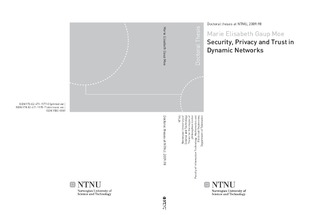| dc.description.abstract | Emergent networks like mobile ad hoc networks, sensor networks, opportunistic networks, peer-to-peer networks and social networks are introducing new and exciting opportunities of communication between people and devices. But these dynamic networks also introduce many security- and privacy-related challenges. When dealing with complex and dynamic environments, information about the current level of security or privacy, expressed in a quantified manner, could be of great value in a decision-making process. In order to derive such quantified measures there is a need for mathematical models for security, privacy and trust. The development, application and evaluation of such models are the topics of this thesis.
In order to obtain quantitative measures of security, a state modeling approach, which has traditionally been used to model dependable systems is used. The modeling is based on the view that the notions of security and dependability are integrated concepts, both describing aspects of trustworthy computer systems. The state modeling allows for a probabilistic evaluation of the security of the system, which can be used for security quantification, prediction, risk assessment, intrusion detection and intrusion prevention.
The first part of the thesis describes a real-time risk assessment method for computer networks using hidden Markov modeling. Hidden Markov models are well suited for the modeling of sensor trustworthiness in an intrusion prevention system, and as a result of this research, a new method for aggregation of intrusion detection alerts from multiple intrusion detection systems is proposed. New security metrics for computer networks, such as computer network risk, the mean time to next intrusion and the intrusion frequency, are derived from the Markov models. Hidden Markov models are also used for supporting the actions of agents in dynamic networking environments who are faced with significant degrees of uncertainty in making decisions. Assuming access to perfect information about the environment and the properties of the interacting partners is unrealistic, but if agents are able to establish appropriate trust in each other, the decisions-making process would be facilitated and the risk associated with the interactions could still be acceptable. Trust may also play a significant role for the efficient operation of more general multiagent systems. A novel trust model based on hidden Markov modeling and reinforcement learning has been developed, where the measuring of agent trustworthiness is based on the predicted state probability distribution. Trust modeling is also used as a basis for a decentralized reputation system suitable for dynamic multiagent environments.
As infrastructures are gradually becoming more intelligent, trust may play an increasingly important role in the interactions between network components. A trust-based security extension to the mobile ad hoc network dynamic source routing protocol is given, where the state probability of a node, according to its corresponding hidden Markov model, is being used for deciding the node’s trustworthiness. Nodes with different trustworthiness may be offered different service levels based on a trust policy. Since network services normally will be denied to untrusted nodes, an incentive for nodes not to misbehave is created.
Users in dynamic networking environments like mobile ad hoc networks would be particularly exposed to threats against their privacy since they have limited control over the trustworthiness of network nodes that handle the messages sent. Appropriate privacy enhancing cryptographic mechanisms, which can be trusted to work as intended, are required to handle this problem. A novel approach to quantifying the amount of privacy that is offered by anonymous ad hoc routing protocols using conditional entropy is given, which takes into account the proportion of adversarial nodes and includes the a priori knowledge of the attacker. | nb_NO |

